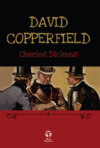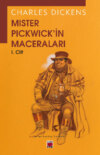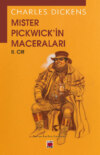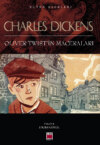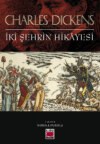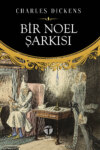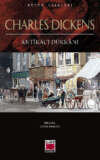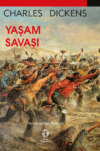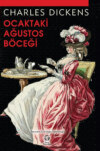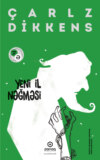Kitabı oku: «Pictures from Italy», sayfa 8
At night, when two votive lamps burnt before an image of the Virgin, in a gallery outside the great cathedral, near the roof, I fancied that the great piazza of the Winged Lion was a blaze of cheerful light, and that its whole arcade was thronged with people; while crowds were diverting themselves in splendid coffee-houses opening from it – which were never shut, I thought, but open all night long. When the bronze giants struck the hour of midnight on the bell, I thought the life and animation of the city were all centred here; and as I rowed away, abreast the silent quays, I only saw them dotted, here and there, with sleeping boatmen wrapped up in their cloaks, and lying at full length upon the stones.
But close about the quays and churches, palaces and prisons sucking at their walls, and welling up into the secret places of the town: crept the water always. Noiseless and watchful: coiled round and round it, in its many folds, like an old serpent: waiting for the time, I thought, when people should look down into its depths for any stone of the old city that had claimed to be its mistress.
Thus it floated me away, until I awoke in the old market-place at Verona. I have, many and many a time, thought since, of this strange Dream upon the water: half-wondering if it lie there yet, and if its name be Venice.
BY VERONA, MANTUA, AND MILAN, ACROSS THE PASS OF THE SIMPLON INTO SWITZERLAND
I had been half afraid to go to Verona, lest it should at all put me out of conceit with Romeo and Juliet. But, I was no sooner come into the old market-place, than the misgiving vanished. It is so fanciful, quaint, and picturesque a place, formed by such an extraordinary and rich variety of fantastic buildings, that there could be nothing better at the core of even this romantic town: scene of one of the most romantic and beautiful of stories.
It was natural enough, to go straight from the Market-place, to the House of the Capulets, now degenerated into a most miserable little inn. Noisy vetturíni and muddy market-carts were disputing possession of the yard, which was ankle-deep in dirt, with a brood of splashed and bespattered geese; and there was a grim-visaged dog, viciously panting in a doorway, who would certainly have had Romeo by the leg, the moment he put it over the wall, if he had existed and been at large in those times. The orchard fell into other hands, and was parted off many years ago; but there used to be one attached to the house – or at all events there may have, been, – and the hat (Cappêllo) the ancient cognizance of the family, may still be seen, carved in stone, over the gateway of the yard. The geese, the market-carts, their drivers, and the dog, were somewhat in the way of the story, it must be confessed; and it would have been pleasanter to have found the house empty, and to have been able to walk through the disused rooms. But the hat was unspeakably comfortable; and the place where the garden used to be, hardly less so. Besides, the house is a distrustful, jealous-looking house as one would desire to see, though of a very moderate size. So I was quite satisfied with it, as the veritable mansion of old Capulet, and was correspondingly grateful in my acknowledgments to an extremely unsentimental middle-aged lady, the Padrona of the Hotel, who was lounging on the threshold looking at the geese; and who at least resembled the Capulets in the one particular of being very great indeed in the ‘Family’ way.
From Juliet’s home, to Juliet’s tomb, is a transition as natural to the visitor, as to fair Juliet herself, or to the proudest Juliet that ever has taught the torches to burn bright in any time. So, I went off, with a guide, to an old, old garden, once belonging to an old, old convent, I suppose; and being admitted, at a shattered gate, by a bright-eyed woman who was washing clothes, went down some walks where fresh plants and young flowers were prettily growing among fragments of old wall, and ivy-coloured mounds; and was shown a little tank, or water-trough, which the bright-eyed woman – drying her arms upon her ‘kerchief, called ‘La tomba di Giulietta la sfortunáta.’ With the best disposition in the world to believe, I could do no more than believe that the bright-eyed woman believed; so I gave her that much credit, and her customary fee in ready money. It was a pleasure, rather than a disappointment, that Juliet’s resting-place was forgotten. However consolatory it may have been to Yorick’s Ghost, to hear the feet upon the pavement overhead, and, twenty times a day, the repetition of his name, it is better for Juliet to lie out of the track of tourists, and to have no visitors but such as come to graves in spring-rain, and sweet air, and sunshine.
Pleasant Verona! With its beautiful old palaces, and charming country in the distance, seen from terrace walks, and stately, balustraded galleries. With its Roman gates, still spanning the fair street, and casting, on the sunlight of to-day, the shade of fifteen hundred years ago. With its marble-fitted churches, lofty towers, rich architecture, and quaint old quiet thoroughfares, where shouts of Montagues and Capulets once resounded,
And made Verona’s ancient citizens
Cast by their grave, beseeming ornaments,
To wield old partizans.
With its fast-rushing river, picturesque old bridge, great castle, waving cypresses, and prospect so delightful, and so cheerful! Pleasant Verona!
In the midst of it, in the Piazza di Brá – a spirit of old time among the familiar realities of the passing hour – is the great Roman Amphitheatre. So well preserved, and carefully maintained, that every row of seats is there, unbroken. Over certain of the arches, the old Roman numerals may yet be seen; and there are corridors, and staircases, and subterranean passages for beasts, and winding ways, above ground and below, as when the fierce thousands hurried in and out, intent upon the bloody shows of the arena. Nestling in some of the shadows and hollow places of the walls, now, are smiths with their forges, and a few small dealers of one kind or other; and there are green weeds, and leaves, and grass, upon the parapet. But little else is greatly changed.
When I had traversed all about it, with great interest, and had gone up to the topmost round of seats, and turning from the lovely panorama closed in by the distant Alps, looked down into the building, it seemed to lie before me like the inside of a prodigious hat of plaited straw, with an enormously broad brim and a shallow crown; the plaits being represented by the four-and-forty rows of seats. The comparison is a homely and fantastic one, in sober remembrance and on paper, but it was irresistibly suggested at the moment, nevertheless.
An equestrian troop had been there, a short time before – the same troop, I dare say, that appeared to the old lady in the church at Modena – and had scooped out a little ring at one end of the area; where their performances had taken place, and where the marks of their horses’ feet were still fresh. I could not but picture to myself, a handful of spectators gathered together on one or two of the old stone seats, and a spangled Cavalier being gallant, or a Policinello funny, with the grim walls looking on. Above all, I thought how strangely those Roman mutes would gaze upon the favourite comic scene of the travelling English, where a British nobleman (Lord John), with a very loose stomach: dressed in a blue-tailed coat down to his heels, bright yellow breeches, and a white hat: comes abroad, riding double on a rearing horse, with an English lady (Lady Betsy) in a straw bonnet and green veil, and a red spencer; and who always carries a gigantic reticule, and a put-up parasol.
I walked through and through the town all the rest of the day, and could have walked there until now, I think. In one place, there was a very pretty modern theatre, where they had just performed the opera (always popular in Verona) of Romeo and Juliet. In another there was a collection, under a colonnade, of Greek, Roman, and Etruscan remains, presided over by an ancient man who might have been an Etruscan relic himself; for he was not strong enough to open the iron gate, when he had unlocked it, and had neither voice enough to be audible when he described the curiosities, nor sight enough to see them: he was so very old. In another place, there was a gallery of pictures: so abominably bad, that it was quite delightful to see them mouldering away. But anywhere: in the churches, among the palaces, in the streets, on the bridge, or down beside the river: it was always pleasant Verona, and in my remembrance always will be.
I read Romeo and Juliet in my own room at the inn that night – of course, no Englishman had ever read it there, before – and set out for Mantua next day at sunrise, repeating to myself (in the coupé of an omnibus, and next to the conductor, who was reading the Mysteries of Paris),
There is no world without Verona’s walls
But purgatory, torture, hell itself.
Hence-banished is banished from the world,
And world’s exile is death —
which reminded me that Romeo was only banished five-and-twenty miles after all, and rather disturbed my confidence in his energy and boldness.
Was the way to Mantua as beautiful, in his time, I wonder! Did it wind through pasture land as green, bright with the same glancing streams, and dotted with fresh clumps of graceful trees! Those purple mountains lay on the horizon, then, for certain; and the dresses of these peasant girls, who wear a great, knobbed, silver pin like an English ‘life-preserver’ through their hair behind, can hardly be much changed. The hopeful feeling of so bright a morning, and so exquisite a sunrise, can have been no stranger, even to an exiled lover’s breast; and Mantua itself must have broken on him in the prospect, with its towers, and walls, and water, pretty much as on a commonplace and matrimonial omnibus. He made the same sharp twists and turns, perhaps, over two rumbling drawbridges; passed through the like long, covered, wooden bridge; and leaving the marshy water behind, approached the rusty gate of stagnant Mantua.
If ever a man were suited to his place of residence, and his place of residence to him, the lean Apothecary and Mantua came together in a perfect fitness of things. It may have been more stirring then, perhaps. If so, the Apothecary was a man in advance of his time, and knew what Mantua would be, in eighteen hundred and forty-four. He fasted much, and that assisted him in his foreknowledge.
I put up at the Hotel of the Golden Lion, and was in my own room arranging plans with the brave Courier, when there came a modest little tap at the door, which opened on an outer gallery surrounding a court-yard; and an intensely shabby little man looked in, to inquire if the gentleman would have a Cicerone to show the town. His face was so very wistful and anxious, in the half-opened doorway, and there was so much poverty expressed in his faded suit and little pinched hat, and in the thread-bare worsted glove with which he held it – not expressed the less, because these were evidently his genteel clothes, hastily slipped on – that I would as soon have trodden on him as dismissed him. I engaged him on the instant, and he stepped in directly.
While I finished the discussion in which I was engaged, he stood, beaming by himself in a corner, making a feint of brushing my hat with his arm. If his fee had been as many napoleons as it was francs, there could not have shot over the twilight of his shabbiness such a gleam of sun, as lighted up the whole man, now that he was hired.
‘Well!’ said I, when I was ready, ‘shall we go out now?’
‘If the gentleman pleases. It is a beautiful day. A little fresh, but charming; altogether charming. The gentleman will allow me to open the door. This is the Inn Yard. The court-yard of the Golden Lion! The gentleman will please to mind his footing on the stairs.’
We were now in the street.
‘This is the street of the Golden Lion. This, the outside of the Golden Lion. The interesting window up there, on the first Piano, where the pane of glass is broken, is the window of the gentleman’s chamber!’
Having viewed all these remarkable objects, I inquired if there were much to see in Mantua.
‘Well! Truly, no. Not much! So, so,’ he said, shrugging his shoulders apologetically.
‘Many churches?’
‘No. Nearly all suppressed by the French.’
‘Monasteries or convents?’
‘No. The French again! Nearly all suppressed by Napoleon.’
‘Much business?’
‘Very little business.’
‘Many strangers?’
‘Ah Heaven!’
I thought he would have fainted.
‘Then, when we have seen the two large churches yonder, what shall we do next?’ said I.
He looked up the street, and down the street, and rubbed his chin timidly; and then said, glancing in my face as if a light had broken on his mind, yet with a humble appeal to my forbearance that was perfectly irresistible:
‘We can take a little turn about the town, Signore!’ (Si può far ’un píccolo gíro della citta).
It was impossible to be anything but delighted with the proposal, so we set off together in great good-humour. In the relief of his mind, he opened his heart, and gave up as much of Mantua as a Cicerone could.
‘One must eat,’ he said; ‘but, bah! it was a dull place, without doubt!’
He made as much as possible of the Basilica of Santa Andrea – a noble church – and of an inclosed portion of the pavement, about which tapers were burning, and a few people kneeling, and under which is said to be preserved the Sangreal of the old Romances. This church disposed of, and another after it (the cathedral of San Pietro), we went to the Museum, which was shut up. ‘It was all the same,’ he said. ‘Bah! There was not much inside!’ Then, we went to see the Piazza del Diavolo, built by the Devil (for no particular purpose) in a single night; then, the Piazza Virgiliana; then, the statue of Virgil —our Poet, my little friend said, plucking up a spirit, for the moment, and putting his hat a little on one side. Then, we went to a dismal sort of farm-yard, by which a picture-gallery was approached. The moment the gate of this retreat was opened, some five hundred geese came waddling round us, stretching out their necks, and clamouring in the most hideous manner, as if they were ejaculating, ‘Oh! here’s somebody come to see the Pictures! Don’t go up! Don’t go up!’ While we went up, they waited very quietly about the door in a crowd, cackling to one another occasionally, in a subdued tone; but the instant we appeared again, their necks came out like telescopes, and setting up a great noise, which meant, I have no doubt, ‘What, you would go, would you! What do you think of it! How do you like it!’ they attended us to the outer gate, and cast us forth, derisively, into Mantua.
The geese who saved the Capitol, were, as compared to these, Pork to the learned Pig. What a gallery it was! I would take their opinion on a question of art, in preference to the discourses of Sir Joshua Reynolds.
Now that we were standing in the street, after being thus ignominiouly escorted thither, my little friend was plainly reduced to the ‘píccolo gíro,’ or little circuit of the town, he had formerly proposed. But my suggestion that we should visit the Palazzo Tè (of which I had heard a great deal, as a strange wild place) imparted new life to him, and away we went.
The secret of the length of Midas’s ears, would have been more extensively known, if that servant of his, who whispered it to the reeds, had lived in Mantua, where there are reeds and rushes enough to have published it to all the world. The Palazzo Tè stands in a swamp, among this sort of vegetation; and is, indeed, as singular a place as I ever saw.
Not for its dreariness, though it is very dreary. Not for its dampness, though it is very damp. Nor for its desolate condition, though it is as desolate and neglected as house can be. But chiefly for the unaccountable nightmares with which its interior has been decorated (among other subjects of more delicate execution), by Giulio Romano. There is a leering Giant over a certain chimney-piece, and there are dozens of Giants (Titans warring with Jove) on the walls of another room, so inconceivably ugly and grotesque, that it is marvellous how any man can have imagined such creatures. In the chamber in which they abound, these monsters, with swollen faces and cracked cheeks, and every kind of distortion of look and limb, are depicted as staggering under the weight of falling buildings, and being overwhelmed in the ruins; upheaving masses of rock, and burying themselves beneath; vainly striving to sustain the pillars of heavy roofs that topple down upon their heads; and, in a word, undergoing and doing every kind of mad and demoniacal destruction. The figures are immensely large, and exaggerated to the utmost pitch of uncouthness; the colouring is harsh and disagreeable; and the whole effect more like (I should imagine) a violent rush of blood to the head of the spectator, than any real picture set before him by the hand of an artist. This apoplectic performance was shown by a sickly-looking woman, whose appearance was referable, I dare say, to the bad air of the marshes; but it was difficult to help feeling as if she were too much haunted by the Giants, and they were frightening her to death, all alone in that exhausted cistern of a Palace, among the reeds and rushes, with the mists hovering about outside, and stalking round and round it continually.
Our walk through Mantua showed us, in almost every street, some suppressed church: now used for a warehouse, now for nothing at all: all as crazy and dismantled as they could be, short of tumbling down bodily. The marshy town was so intensely dull and flat, that the dirt upon it seemed not to have come there in the ordinary course, but to have settled and mantled on its surface as on standing water. And yet there were some business-dealings going on, and some profits realising; for there were arcades full of Jews, where those extraordinary people were sitting outside their shops, contemplating their stores of stuffs, and woollens, and bright handkerchiefs, and trinkets: and looking, in all respects, as wary and business-like, as their brethren in Houndsditch, London.
Having selected a Vetturíno from among the neighbouring Christians, who agreed to carry us to Milan in two days and a half, and to start, next morning, as soon as the gates were opened, I returned to the Golden Lion, and dined luxuriously in my own room, in a narrow passage between two bedsteads: confronted by a smoky fire, and backed up by a chest of drawers. At six o’clock next morning, we were jingling in the dark through the wet cold mist that enshrouded the town; and, before noon, the driver (a native of Mantua, and sixty years of age or thereabouts) began to ask the way to Milan.
It lay through Bozzolo; formerly a little republic, and now one of the most deserted and poverty-stricken of towns: where the landlord of the miserable inn (God bless him! it was his weekly custom) was distributing infinitesimal coins among a clamorous herd of women and children, whose rags were fluttering in the wind and rain outside his door, where they were gathered to receive his charity. It lay through mist, and mud, and rain, and vines trained low upon the ground, all that day and the next; the first sleeping-place being Cremona, memorable for its dark brick churches, and immensely high tower, the Torrazzo – to say nothing of its violins, of which it certainly produces none in these degenerate days; and the second, Lodi. Then we went on, through more mud, mist, and rain, and marshy ground: and through such a fog, as Englishmen, strong in the faith of their own grievances, are apt to believe is nowhere to be found but in their own country, until we entered the paved streets of Milan.
The fog was so dense here, that the spire of the far-famed Cathedral might as well have been at Bombay, for anything that could be seen of it at that time. But as we halted to refresh, for a few days then, and returned to Milan again next summer, I had ample opportunities of seeing the glorious structure in all its majesty and beauty.
All Christian homage to the saint who lies within it! There are many good and true saints in the calendar, but San Carlo Borromeo has – if I may quote Mrs. Primrose on such a subject – ‘my warm heart.’ A charitable doctor to the sick, a munificent friend to the poor, and this, not in any spirit of blind bigotry, but as the bold opponent of enormous abuses in the Romish church, I honour his memory. I honour it none the less, because he was nearly slain by a priest, suborned, by priests, to murder him at the altar: in acknowledgment of his endeavours to reform a false and hypocritical brotherhood of monks. Heaven shield all imitators of San Carlo Borromeo as it shielded him! A reforming Pope would need a little shielding, even now.
The subterranean chapel in which the body of San Carlo Borromeo is preserved, presents as striking and as ghastly a contrast, perhaps, as any place can show. The tapers which are lighted down there, flash and gleam on alti-rilievi in gold and silver, delicately wrought by skilful hands, and representing the principal events in the life of the saint. Jewels, and precious metals, shine and sparkle on every side. A windlass slowly removes the front of the altar; and, within it, in a gorgeous shrine of gold and silver, is seen, through alabaster, the shrivelled mummy of a man: the pontifical robes with which it is adorned, radiant with diamonds, emeralds, rubies: every costly and magnificent gem. The shrunken heap of poor earth in the midst of this great glitter, is more pitiful than if it lay upon a dung-hill. There is not a ray of imprisoned light in all the flash and fire of jewels, but seems to mock the dusty holes where eyes were, once. Every thread of silk in the rich vestments seems only a provision from the worms that spin, for the behoof of worms that propagate in sepulchres.
In the old refectory of the dilapidated Convent of Santa Maria delle Grazie, is the work of art, perhaps, better known than any other in the world: the Last Supper, by Leonardo da Vinci – with a door cut through it by the intelligent Dominican friars, to facilitate their operations at dinner-time.
I am not mechanically acquainted with the art of painting, and have no other means of judging of a picture than as I see it resembling and refining upon nature, and presenting graceful combinations of forms and colours. I am, therefore, no authority whatever, in reference to the ‘touch’ of this or that master; though I know very well (as anybody may, who chooses to think about the matter) that few very great masters can possibly have painted, in the compass of their lives, one-half of the pictures that bear their names, and that are recognised by many aspirants to a reputation for taste, as undoubted originals. But this, by the way. Of the Last Supper, I would simply observe, that in its beautiful composition and arrangement, there it is, at Milan, a wonderful picture; and that, in its original colouring, or in its original expression of any single face or feature, there it is not. Apart from the damage it has sustained from damp, decay, or neglect, it has been (as Barry shows) so retouched upon, and repainted, and that so clumsily, that many of the heads are, now, positive deformities, with patches of paint and plaster sticking upon them like wens, and utterly distorting the expression. Where the original artist set that impress of his genius on a face, which, almost in a line or touch, separated him from meaner painters and made him what he was, succeeding bunglers, filling up, or painting across seams and cracks, have been quite unable to imitate his hand; and putting in some scowls, or frowns, or wrinkles, of their own, have blotched and spoiled the work. This is so well established as an historical fact, that I should not repeat it, at the risk of being tedious, but for having observed an English gentleman before the picture, who was at great pains to fall into what I may describe as mild convulsions, at certain minute details of expression which are not left in it. Whereas, it would be comfortable and rational for travellers and critics to arrive at a general understanding that it cannot fail to have been a work of extraordinary merit, once: when, with so few of its original beauties remaining, the grandeur of the general design is yet sufficient to sustain it, as a piece replete with interest and dignity.
We achieved the other sights of Milan, in due course, and a fine city it is, though not so unmistakably Italian as to possess the characteristic qualities of many towns far less important in themselves. The Corso, where the Milanese gentry ride up and down in carriages, and rather than not do which, they would half starve themselves at home, is a most noble public promenade, shaded by long avenues of trees. In the splendid theatre of La Scala, there was a ballet of action performed after the opera, under the title of Prometheus: in the beginning of which, some hundred or two of men and women represented our mortal race before the refinements of the arts and sciences, and loves and graces, came on earth to soften them. I never saw anything more effective. Generally speaking, the pantomimic action of the Italians is more remarkable for its sudden and impetuous character than for its delicate expression, but, in this case, the drooping monotony: the weary, miserable, listless, moping life: the sordid passions and desires of human creatures, destitute of those elevating influences to which we owe so much, and to whose promoters we render so little: were expressed in a manner really powerful and affecting. I should have thought it almost impossible to present such an idea so strongly on the stage, without the aid of speech.
Milan soon lay behind us, at five o’clock in the morning; and before the golden statue on the summit of the cathedral spire was lost in the blue sky, the Alps, stupendously confused in lofty peaks and ridges, clouds and snow, were towering in our path.
Still, we continued to advance toward them until nightfall; and, all day long, the mountain tops presented strangely shifting shapes, as the road displayed them in different points of view. The beautiful day was just declining, when we came upon the Lago Maggiore, with its lovely islands. For however fanciful and fantastic the Isola Bella may be, and is, it still is beautiful. Anything springing out of that blue water, with that scenery around it, must be.
It was ten o’clock at night when we got to Domo d’Ossola, at the foot of the Pass of the Simplon. But as the moon was shining brightly, and there was not a cloud in the starlit sky, it was no time for going to bed, or going anywhere but on. So, we got a little carriage, after some delay, and began the ascent.
It was late in November; and the snow lying four or five feet thick in the beaten road on the summit (in other parts the new drift was already deep), the air was piercing cold. But, the serenity of the night, and the grandeur of the road, with its impenetrable shadows, and deep glooms, and its sudden turns into the shining of the moon and its incessant roar of falling water, rendered the journey more and more sublime at every step.
Soon leaving the calm Italian villages below us, sleeping in the moonlight, the road began to wind among dark trees, and after a time emerged upon a barer region, very steep and toilsome, where the moon shone bright and high. By degrees, the roar of water grew louder; and the stupendous track, after crossing the torrent by a bridge, struck in between two massive perpendicular walls of rock that quite shut out the moonlight, and only left a few stars shining in the narrow strip of sky above. Then, even this was lost, in the thick darkness of a cavern in the rock, through which the way was pierced; the terrible cataract thundering and roaring close below it, and its foam and spray hanging, in a mist, about the entrance. Emerging from this cave, and coming again into the moonlight, and across a dizzy bridge, it crept and twisted upward, through the Gorge of Gondo, savage and grand beyond description, with smooth-fronted precipices, rising up on either hand, and almost meeting overhead. Thus we went, climbing on our rugged way, higher and higher all night, without a moment’s weariness: lost in the contemplation of the black rocks, the tremendous heights and depths, the fields of smooth snow lying, in the clefts and hollows, and the fierce torrents thundering headlong down the deep abyss.
Towards daybreak, we came among the snow, where a keen wind was blowing fiercely. Having, with some trouble, awakened the inmates of a wooden house in this solitude: round which the wind was howling dismally, catching up the snow in wreaths and hurling it away: we got some breakfast in a room built of rough timbers, but well warmed by a stove, and well contrived (as it had need to be) for keeping out the bitter storms. A sledge being then made ready, and four horses harnessed to it, we went, ploughing, through the snow. Still upward, but now in the cold light of morning, and with the great white desert on which we travelled, plain and clear.
We were well upon the summit of the mountain: and had before us the rude cross of wood, denoting its greatest altitude above the sea: when the light of the rising sun, struck, all at once, upon the waste of snow, and turned it a deep red. The lonely grandeur of the scene was then at its height.
As we went sledging on, there came out of the Hospice founded by Napoleon, a group of Peasant travellers, with staves and knapsacks, who had rested there last night: attended by a Monk or two, their hospitable entertainers, trudging slowly forward with them, for company’s sake. It was pleasant to give them good morning, and pretty, looking back a long way after them, to see them looking back at us, and hesitating presently, when one of our horses stumbled and fell, whether or no they should return and help us. But he was soon up again, with the assistance of a rough waggoner whose team had stuck fast there too; and when we had helped him out of his difficulty, in return, we left him slowly ploughing towards them, and went slowly and swiftly forward, on the brink of a steep precipice, among the mountain pines.

